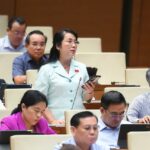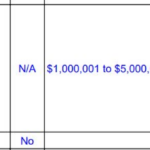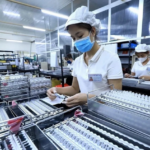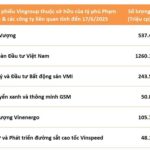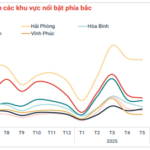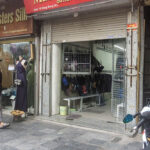On the morning of June 19th, the National Assembly conducted inquiries and answered questions related to the field of finance.
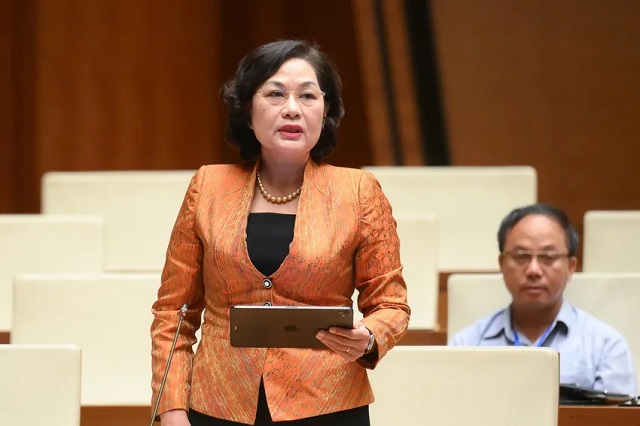
Governor of the State Bank of Vietnam, Nguyen Thi Hong. Photo: NA
|
Joining Minister Nguyen Van Thang during the inquiry session, Governor Nguyen Thi Hong of the State Bank of Vietnam acknowledged that, from an investment perspective, the country’s economic growth relies heavily on capital, but the efficiency is not optimal. This is reflected in Vietnam’s ICO index being significantly higher than that of other countries and regions.
“We have not fully utilized our advantages in terms of capital, technology transfer, management skills, and there is a lack of connection between this sector and domestic sectors,” said Hong, suggesting the need for a new strategy in attracting FDI in the next phase.
According to the Governor, foreign capital can be diversified through FDI attraction, indirect investment, and foreign borrowing. With the current foreign debt and public debt indicators, there is room for expansion in attracting foreign investment.
Hong remarked that domestic capital is largely dependent on bank credit, including medium and long-term capital. Credit balance as a percentage of GDP stood at 134% at the end of 2024.
“If we continue to rely on bank capital, it will pose risks to the system and may have adverse effects on the economy,” Hong said, emphasizing that for high and sustainable growth, ministries and sectors, including the Ministry of Finance and the State Bank, must pay attention to balancing capital sources for economic growth targets.
The Governor of the State Bank emphasized that in 2025, as the country shifts towards acceleration and breakthrough to achieve growth of 8% and above, the State Bank has set a credit growth target of about 16%.
“We can make adjustments if inflation remains under control,” Hong added.
Not Attracting FDI at All Costs
Also related to foreign capital, in response to Deputy Mai Van Hai’s question about FDI attraction in the new context, Mr. Thang said that the current global investment trend focuses on high technology, core technology, semiconductors, artificial intelligence, renewable energy, etc.
Southeast Asia has emerged as a top priority for some countries due to its positive growth. Vietnam is considered an attractive destination for international investment due to its appropriate FDI attraction strategy. Vietnam enjoys political stability, high prestige, and a favorable investment environment.
FDI inflows into Vietnam have been maintained “very positively,” despite adverse external impacts. As of May 31, the country had 44,000 FDI projects with a total registered capital of 517 billion USD; cumulative realized capital reached 331.5 billion USD. The FDI sector contributed 20.5 billion USD to the state budget in 2024. “This is a very significant contribution,” said Minister Thang.
Regarding the orientation of FDI attraction in the coming time, to achieve the set goal of building the country into a developed country by 2045, it is necessary to “shift the focus of FDI attraction selectively”. Specifically, Vietnam will prioritize projects with high technology, innovation, added value, and environmental friendliness, instead of chasing quantity at all costs.
Strategic partners of Vietnam such as the G7, South Korea, Japan, Singapore, Taiwan, the US, and the EU are the focus of investment promotion associated with the fields that Vietnam is encouraging to develop.
FDI Enterprises Will Have to Transfer Technology
Deputy Le Thi Ngoc Linh raised the issue that the private economy is one of the driving forces for the development of the country’s economy. However, in the past time, many private enterprises have faced difficulties in accessing capital, technology, and deep participation in the global value chain. Are there any breakthrough policies to encourage the private sector to invest in research, development, innovation, and digital transformation instead of focusing on traditional fields? Are there any specific financial mechanisms to support leading private enterprises to reach the regional and international levels, Ms. Linh asked.
Minister Nguyen Van Thang answered that most private enterprises, especially small and medium-sized enterprises in Vietnam, are currently outside or participating in the low value-added segment of the global supply chain.
This situation arises from three main reasons. First is the limited internal capacity of domestic private enterprises, which do not yet meet the strict standards of global supply chains. Moreover, when FDI enterprises enter Vietnam, they often bring their ecosystems from abroad, so they do not open up collaborative space for domestic enterprises. “To be frank, Vietnam’s policies to encourage the private sector are not strong enough for large enterprises or FDI enterprises to support and lead small and medium-sized enterprises to develop together,” said Minister Thang.
Therefore, the Ministry of Finance is actively implementing five groups of solutions. First is to develop high-value-added industry chains, especially in supporting industries, information technology, and creative industries. FDI enterprises are encouraged to lead domestic supply chains and connect with small and medium-sized enterprises.
Investment incentive policies will be adjusted, including conditions for technology transfer. Large FDI projects need to have plans to use domestic supply chains and support small and medium-sized enterprises. “In the process of attracting investment, all these issues must be raised and specific requirements with legal validity must be set so that FDI enterprises must comply, avoiding the situation in the past time,” affirmed Minister Thang.
The next solution mentioned by Mr. Thang is to review and amend tax policies so that large enterprises can support small and medium-sized enterprises, such as allowing large enterprises to include in deductible expenses for determining taxable income the expenses for training and retraining human resources of small and medium-sized enterprises participating in the chain.
Small and medium-sized enterprises are also supported to promote the application of science and technology and invest in machinery and equipment…
– 13:25 19/06/2025
“Minister of Finance Addresses the ‘Money Available but Not Spent’ Conundrum”
“Lawmakers have raised concerns about citizens’ frustrations regarding inaccessible funds allocated for public investment disbursement. Minister of Finance Nguyen Van Thang has acknowledged the issue and identified several causes, pledging to implement solutions to address this matter promptly.”
“Ho Chi Minh City Attracts Over $2.86 Billion USD in Industrial and Export Processing Zone Investments”
Investing in Ho Chi Minh City’s industrial and export processing zones has reached an impressive figure of over $2.86 billion. This includes a substantial foreign investment component of more than $935.3 million, with domestic investment contributing a significant $45,437 billion, equivalent to over $1.9 billion.
Is Record Margin Debt a Risk?
“At the ‘Investment Strategies in a New Context’ seminar held on the morning of June 14, 2025, investors raised a pertinent question: where does the current margin debt stand in historical context, and what level would trigger market risk? Experts from Rong Viet Securities (VDSC) provided their insights on this crucial topic.”



























